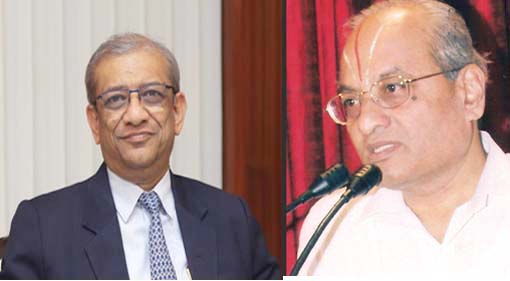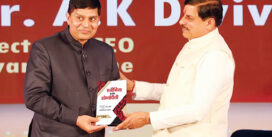- टास्कअस ने हर महीने 250 से ज़्यादा नए स्टाफ को नियुक्त करने की योजना के साथ इंदौर में तेजी से विस्तार शुरू किया
- Capture Every Live Moment: OPPO Reno13 Series Launched in India with New MediaTek Dimensity 8350 Chipset and AI-Ready Cameras
- OPPO India ने नए AI फीचर्स के साथ पेश की Reno13 सीरीज़
- इंदौर एनिमल लिबरेशन की पहल: जानवरों के अधिकारों का हो समर्थन
- सपनों को साकार करने का मंच बन रहा है ‘प्लास्ट पैक 2025’
N Rangachary advocates setting up National Assets Depository Ledger to address business risks and data privacy issues

“The unknowns in the Indian financial sector trigger regulatory fiat and bailouts at a regular frequency. Statistical sophistication, mathematical modeling and advancement in computing modeling demands soul searching”, emphasized Shri N Rangachary, the founding Chairman of IRDAI.
Hyderabad, May 2021: “It was the spring of hope, it was the winter of despair” – the words of Charles Dickens during the French Revolution echoed in an inaugural address by Shri N Rangachary, the founding Chairman of Insurance Regulatory and Development Authority of India (IRDAI). While inaugurating the Hyderabad Chapter of PRMIA – a leading global association of Risk Professionals – the veteran leader put the spotlight on the importance of risk management for the country to achieve its economic potential!
PRMIA organized a webinar where a galaxy of experts from the financial sector highlighted the need to strengthen the risk management architecture of the industry, critical to navigate the uncertain future amidst Covid-19. The experts view the pandemic as an ideal Stress-Test for the Indian economy, business and markets.
The Chief Guest of the event, Shri N Rangachary, advocated setting up National Assets Depository Ledger (NADEL) to address business risks and data privacy in the Indian financial sector. This entity could be the repository of the citizens’ data – transactional or static information, stored based on their consent.
Shri Rangachary said, “Risk, like God, is omnipresent. A lot of good work in academics, the business world, and policy-making bodies has been accomplished. The core question is how the unknowns in our financial sector trigger heavy regulatory fiat and bailouts at regular frequency despite such statistical sophistication, mathematical modeling and advancement in computing modeling. “
“All our great institutions in the Indian financial sector, such as SEBI, RBI, IAI, ICAI, and IRDAI play a pivotal role in dealing with a part of the “associated risks”. But, given the complex interplay of various market segments, greater coordination among the market players in banking, insurance and capital markets along with the regulators is crucial towards effective identification, assessment, transfer, and mitigation of risks”, emphasized Shri Rangachary.
Delivering the keynote address, Shri Praveen Kumar Gupta, former Managing Director of State Bank of India, brought out the distinction between Risk and Uncertainty. He said that while both preclude knowledge of future states, a lack of predictability arises from insufficient knowledge (uncertainty) or from a well-understood probabilistic process (Risk).
“Global Financial crisis in 2008-09, the Asian crisis in the 1990s, or the current COVID-19 pandemic are Black Swan or 3-sigma events now occurring more frequently. To this end, we should work to maximize the potential for positive surprises and cushion the impact of negative ones, by diversifying our actions and having a buffer ready, a margin of safety, should those downside shocks exceed our expectations”, added Shri Praveen Kumar Gupta
On this occasion, a panel discussion was conducted with a cross-section of experts comprising Shri Vishesh Kumar Srivastava – Group Chief Risk Officer of Punjab National Bank, Shri Piyush Kabra – Chief risk Officer from Mindtree and Shri Siddhartha Sanyal – Chief Economist from Bandhan Bank. Dr. Srinivasa Rao, Professor from IIRM, brilliantly moderated the panel discussion.
Shri Srivastava outlined the increasing challenges of risk management in the financial sector, wherein diversification of products, increased customer base, lines of consumer banking business, new regulatory dispensations, and cybersecurity add new dimensions to the risks.
While talking about competency, Shri Srivastava said, “PRMIA certified people can be a durable source to meet the demands of the financial sector. Well-qualified manpower can be a potential source to mitigate the emerging risks. Grooming line management to remain sensitive to various risks is equally important.”
Comparing the current environment to that of post “2nd World War”, Shri Kabra from Mindtree added the catastrophic risks like COVID-19 are difficult to apprehend and mitigate. While making every effort to build resilience to meet catastrophic risks, it is necessary to explore such risks to learn the nuances of managing them.
Shri Sidhartha Sanyal, while speaking about macroeconomic risks in current uncertainty, emphasized boosting of demand for goods and services to enhance productivity, employment and wider economic activities. Otherwise, risks will continue that may push inflation and curb economic growth.
Ken Radigan, CEO of PRMIA Global, thanked volunteers for the excellent work. He announced a partnership with SRICHID Academy to boost risk training and job placement assistance to India’s PRMIA community, which was appreciated by participants with thunderous applause.
Nirakar Pradhan, CEO of PRMIA India, welcomed guests and highlighted its impressive journey in India during the last two years. Even though a late starter in the country, PRMIA has opened five chapters and conducted 18 market events.


